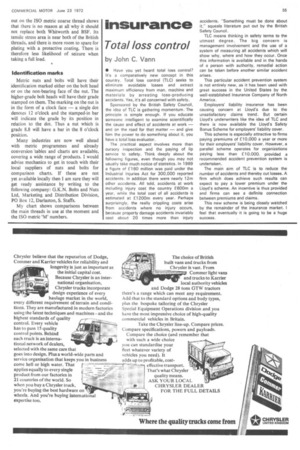insurance
Page 55

If you've noticed an error in this article please click here to report it so we can fix it.
Total loss control
by John C. Vann
• Have you yet heard total loss control? It's a comparatively new concept in this country. Total loss control (TLC) seeks to eliminate avoidable losses and extract maximum efficiency from man, machine and materials by arresting loss-producing accidents. Yes, it's all concerned with safety.
Sponsored by the British Safety Council, the idea of TLC is gathering momentum.. The principle is simple enough. If you educate someone intelligent to examine scientifically the cause and effect of accidents at work — and on the road for that matter — and give him the power to do something about it, you have a total loss evaluator.
The practical aspect involves more than cursory inspection and the paying of lip service to safety. Think deeply about the following figures, even though you may not usually take much notice of statistics. In 1969 a figure of £160 million was paid under the Industrial Injuries Act for 300,000 reported accidents. In addition there were nearly 12m other accidents. All told, accidents at work including injury cost the country £600m a year, while the total cost of all accidents is estimated at E1200m every year. Perhaps surprisingly, the really crippling costs arise from accidents where no injury occurs, because property damage accidents invariably cost about 20 times more than injury accidents. "Something must be .done about it," squeals literature put out by the British Safety Council.
TLC means thinking in safety terms to the utmost degree. The big concern is management involvement and the use of a system of measuring all accidents which will show why, where and how they occur. Once this information is available and in the hands of a person with authority, remedial action can be taken before another similar accident arises.
This particular accident prevention system is not entirely new, as it has been used with great success in the United States by the well-established Insurance Company of North America.
Employers' liability insurance has been causing concern at Lloyd's due to the unsatisfactory claims trend. But certain Lloyd's underwriters like the idea of TLC and there is now available the Lloyd's Safety Bonus Scheme for employers' liability cover, This scheme is especially attractive to firms paying premiums of £10,000 a year or more for their employers' liability cover. However, a parallel scheme operates for organizations paying less than £10,000, provided a recommended accident prevention system is undertaken.
The main aim of TLC is to reduce the number of accidents and thereby cut losses. A firm which does achieve such results can expect to pay a lower premium under the Lloyd's scheme. An incentive is thus provided and firms can see a definite connection between premiums and claims.
This new scheme is being closely watched by the remainder of the insurance market. I feel that eventually it is going to be a huge success.












































































































